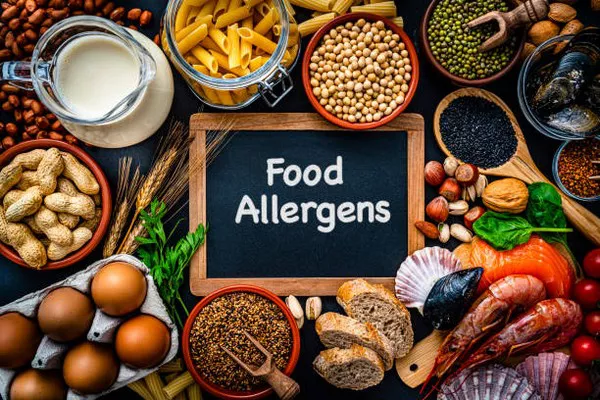Living with a nut allergy requires careful attention to dietary choices to prevent allergic reactions. Nuts and nut-containing products are ubiquitous in the food industry, making it essential for individuals with nut allergies to be vigilant about reading labels and avoiding potential allergens. This article explores the foods to avoid when you have nut allergies and provides tips for navigating the complex landscape of allergen-containing foods.
Nut Allergies
Before delving into the foods to avoid, it’s crucial to understand what nut allergies entail. Nut allergies occur when the immune system mistakenly identifies proteins found in nuts as harmful invaders. When a person with a nut allergy ingests or comes into contact with nuts, their immune system responds by releasing chemicals such as histamine, leading to allergic symptoms.
Nut allergies can range from mild to severe, with symptoms including skin rash, itching, swelling, difficulty breathing, gastrointestinal distress, and, in severe cases, anaphylaxis—a life-threatening allergic reaction that requires immediate medical attention.
Common Nut Allergens
Several types of nuts can trigger allergic reactions in sensitive individuals. The most common nut allergens include:
Peanuts
Almonds
Cashews
Walnuts
Hazelnuts
Pecans
Pistachios
Brazil nuts
Macadamia nuts
Pine nuts
While these nuts are among the most prevalent allergens, individuals may also be allergic to other nuts or seeds, such as sesame seeds or sunflower seeds. It’s essential for individuals with nut allergies to consult an allergist to determine their specific allergens and develop a personalized management plan.
14 Foods to Avoid When You Have Nut Allergies
Avoiding nuts and nut-containing products is the cornerstone of managing nut allergies. However, nuts can be present in various foods, often in unexpected forms. Here are some foods and ingredients to steer clear of when you have a nut allergy:
1. Nut Butters: Peanut butter, almond butter, cashew butter, and other nut spreads are obvious sources of nuts and should be avoided. Even if a product is labeled as “seed butter,” cross-contamination with nuts may occur during manufacturing.
2. Mixed Nuts: Trail mix, mixed nuts, and nut clusters often contain an assortment of nuts, making them unsafe for individuals with nut allergies.
3. Nut Milks: Almond milk, cashew milk, and other nut-based milk alternatives are increasingly popular, but they pose a risk for individuals with nut allergies. Opt for alternative milk options such as soy milk, rice milk, or oat milk.
4. Nut Oils: Some cooking oils, such as almond oil or walnut oil, are derived from nuts and may contain traces of allergenic proteins. Check ingredient labels carefully and choose oils that are labeled as nut-free.
5. Marzipan and Nougat: These confections often contain ground almonds or other nuts as a primary ingredient, making them off-limits for individuals with nut allergies.
6. Baked Goods: Cakes, cookies, pastries, and other baked goods may contain nuts or nut flours. Always inquire about allergen information when purchasing baked goods or opt for nut-free alternatives.
7. Asian Cuisine: Many Asian dishes, such as stir-fries, sauces, and curries, contain peanuts or peanut-based ingredients. Exercise caution when dining out at Asian restaurants and inquire about potential nut ingredients.
8. Granola Bars and Cereal: Granola bars and cereals often contain nuts or nut fragments for added texture and flavor. Choose nut-free granola bars and cereals or make your own at home using nut-free ingredients.
9. Salad Dressings: Some salad dressings, particularly vinaigrettes and creamy dressings, may contain nut oils or nut-based ingredients. Read labels carefully and opt for dressings labeled as nut-free.
10. Ice Cream and Frozen Desserts: Certain ice cream flavors, such as butter pecan or pistachio, contain nuts as a primary ingredient. Check labels thoroughly and choose nut-free ice cream options.
11. Energy Bars and Protein Bars: Many energy bars and protein bars contain nuts or nut-derived ingredients for added protein and flavor. Look for bars specifically labeled as nut-free or allergen-friendly.
12. Nutritional Supplements: Some nutritional supplements, including protein powders and meal replacement shakes, may contain nut ingredients. Choose supplements that are certified as nut-free or consult a healthcare professional for recommendations.
13. Restaurant Foods: When dining out, always communicate your nut allergy to restaurant staff and inquire about potential nut ingredients in dishes. Cross-contamination with nuts is a significant concern in restaurant kitchens, so choose restaurants with robust allergen protocols whenever possible.
14. Ethnic Foods: Foods from various cultural cuisines, such as Indian, Thai, and Middle Eastern dishes, may contain nuts or nut-based ingredients. Exercise caution when trying new foods and ask about allergen information.
See Also: Nut Allergies: Causes, Types, Symptoms & Management
Conclusion
Navigating life with a nut allergy requires diligence, awareness, and proactive communication. By familiarizing yourself with common sources of nuts and nut-containing products, reading labels carefully, and advocating for your safety when dining out, you can effectively manage your nut allergy and reduce the risk of allergic reactions. Remember to consult with healthcare professionals, including allergists and dietitians, for personalized guidance and support in managing your nut allergy. With proper precautions and education, individuals with nut allergies can lead healthy and fulfilling lives.


